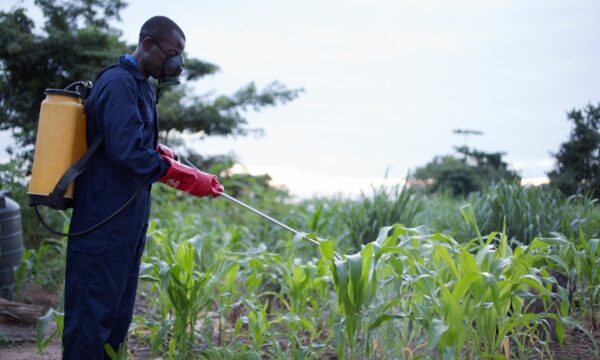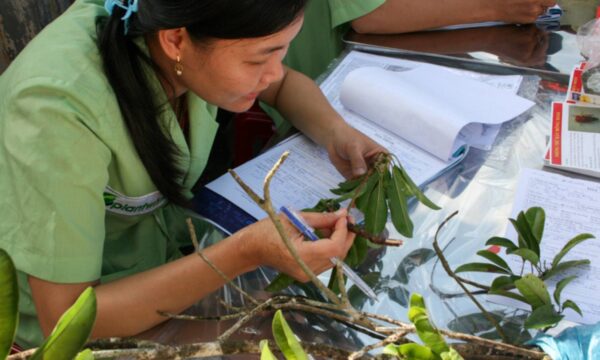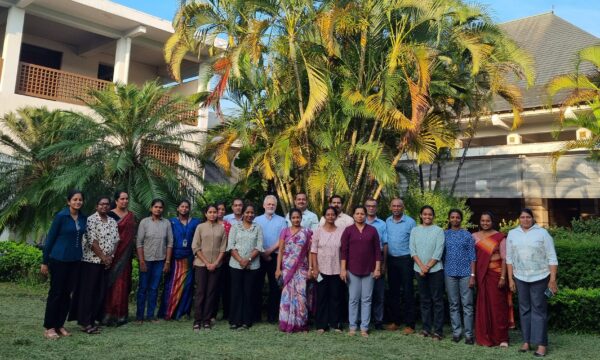The gender digital divide is impacting women’s access and use of digital agricultural tools. In recent years, there has been significant growth in digital technologies aimed at farmers and farmer advisors. These technologies offer opportunities for growth and development by boosting the reach of agricultural knowledge, services, and support. However, as with face-to-face agricultural advisory services, the benefits brought by digital technologies do not always reach women farmers.

PlantwisePlus recently conducted a study into gender and digital advisory services in Ghana. The aim was to understand opportunities for bridging the gender digital divide experienced by farmers and agricultural service providers.
The study titled Gender and Digital Advisory Tools Assessment in Ghana was conducted through a series of interviews and discussion groups and took place in Ghana’s Bono and Ashanti regions. It revealed a significant gender gap in accessing and using PlantwisePlus and other digital tools. Gender disparities are particularly pronounced at the community level, with the study highlighting the many obstacles facing women in agriculture.
Digital divide: Barriers facing women farmers and farmer advisors
Digital illiteracy
The discussion participants emphasized that many women in Ghana cannot read or write due to a lack of formal education. As a result, they need help to easily use a phone and often rely on others for basic functions such as making calls.
Therefore, although digital tools have the potential to enhance farmer productivity and livelihoods, low digital literacy stops women from accessing vital information.
“The thing is we are illiterate so even if they send us a message, we won’t see it.”
Focus Group Discussion, Ejisu-Asosuanso – Young Female, November 2023
Cultural and social constraints
Societal norms are another hurdle women face when using and benefiting from digital technologies. Cultural conventions and ideas, such as women not listening to the radio, stop them from receiving helpful information.
Moreover, women are more likely to be busy with household duties such as cooking, cleaning, and childcare. As a result, they have limited time to learn how to use digital tools or receive advisory information.
“Busy schedules are the barriers preventing me from using digital advisory tools to help myself. Please I don’t have time to listen to the radio or watch Television.“
Focus Group Discussion, Ejura – Young Female, November 2023

Language and content relevance
The study showed that language is a significant barrier to Ghanaian women engaging with digital advisory services. English is challenging to understand when spoken and written, making it tough to follow directions, send messages, or get information.
“I do not understand the English language, so it sometimes becomes difficult to understand when using these digital tools.”
Focus Group Discussion, Dormaa West, Gyaase – Female Adult, December 2023
Infrastructure challenges
Poor network coverage is a significant issue in many parts of Ghana, hindering the sending and receiving of information and advice.
“The network service is very poor and makes it difficult to send pictures of the farm and other kinds of messages to the agricultural officer.“
Focus Group Discussion, Dormaa West, Gyaase – Female Adult, 5th December 2023
Financial exclusion
The focus groups in Ghana highlighted how money is often a barrier to accessing and using technology. Women cannot afford to buy phones or pay for associated costs like data. Finances also impact their communication preferences, with many preferring texts over calls.
“Sometimes, when you call, you might not reach the person. But if you send it, it will be faster than using the phone calls. So, smartphones are good and if you don’t have money to buy, then you have problems.”
Focus Group Discussion, Sunyani East, Nkrankrom – Young Female, 4th December 2023
Recommendations for addressing the digital divide
The study proposes several recommendations for addressing the digital gender divide in Ghana:
1. Gender-Responsive Apps: Creating apps that work offline and cater to the specific needs of both men and women can improve access to gender-responsive extension and advisory services.
2. Capacity Strengthening and Training: Providing training and capacity strengthening for Agriculture Extension Agents (AEAs) and agro-input dealers at the district level. Focusing on females can help close the gender gap and empower women farmers to manage their farms independently.
3. Women-Led Information Networks: Leveraging women-led platforms to connect women farmers to extension and advisory services can enhance outreach at the community level. Collaborating with digital agro-innovation hubs further expands the reach to women in rural communities.
4. Financial Support: Offering financial assistance and training support to women farmers through Village Savings and Loans schemes can facilitate the acquisition of smartphones and internet data, fostering greater access to and use of digital tools.
The study underscores the importance of addressing the gender digital divide in Ghana’s agriculture. There is a need for a gender-sensitive approach in designing and implementing digital tools. Addressing smartphone constraints, promoting digital literacy, and tailoring applications to the specific needs of both men and women farmers are crucial steps to bridge the existing gender gap in access and use of these technologies.
Addressing the gender gap is important because men and women have equal rights to participate in and benefit from development interventions. By implementing the recommended strategies, stakeholders can work towards a more inclusive and equitable agricultural landscape, leveraging digital tools to benefit all, regardless of gender.
Read the full report: Gender and digital advisory tools assessment in Ghana
PlantwisePlus gratefully acknowledges the financial support of the Directorate-General for International Cooperation (DGIS), Netherlands; European Commission Directorate General for International Partnerships (INTPA, EU); the Foreign, Commonwealth & Development Office (FCDO), United Kingdom; and the Swiss Agency for Development and Cooperation (SDC).
Related News & Blogs
How do pest risk registers address the spread of plant pests in Africa?
Pest risk registers can help to solve problems in agriculture, addressing the growing global threat of plant pests. Moreover, changing weather patterns, led by rising temperatures, are causing them to reproduce faster and expand into new regions. In ad…
10 July 2025




